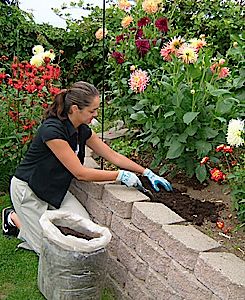By my own admission I will accept that I am unable to dispel the slight disdain that I have for vegetable gardening. I think this seed may have been sown when my horticultural degree split us budding horticulturalists almost immediately into separate streams of “amenity” and “fruit & veg production” – each of whom obviously considered the other inferior.
 With many years of building gardens behind me, I unfortunately have not completely dispelled that view – certainly when it comes to home vegetable production. In my experience vegetable production in the garden is both labour intensive and the sweat/reward balance is distinctly off-centre. I am sure there are many readers who will now be stamping their wellies in a flap of rubbery disapproval, muttering stout words about the quality of last night’s fresh-cut lettuce. I hold out in my defence, however, the incredibly high quality of produce available in many shops, not to mention the sheer number of vegetable gardens that I have built for clients only to return a year or two later to find them untended and unloved (after they discovered just how much time in weeding and tending them is required!).
With many years of building gardens behind me, I unfortunately have not completely dispelled that view – certainly when it comes to home vegetable production. In my experience vegetable production in the garden is both labour intensive and the sweat/reward balance is distinctly off-centre. I am sure there are many readers who will now be stamping their wellies in a flap of rubbery disapproval, muttering stout words about the quality of last night’s fresh-cut lettuce. I hold out in my defence, however, the incredibly high quality of produce available in many shops, not to mention the sheer number of vegetable gardens that I have built for clients only to return a year or two later to find them untended and unloved (after they discovered just how much time in weeding and tending them is required!).
That said, before I am blacklisted for life from the kitchen garden society, perhaps I can redeem myself, if only partly, with an account of what I have found in herb gardening (whereby I use the term “herb” in a loose manner to encapsulate all aromatics). Herbs, unlike vegetables in my opinion, are elegantly multifunctional – both useful and productive, they are simultaneously attractive and are often low maintenance by their very design (the smell of the herb is typically a defence against insect impostors). As a designer, I also have a soft spot for plants that are useful in a variety of settings, as these are the glue that will frequently tie a bed (or indeed even a whole garden) together. Herbs can be grown formally in a contained bed (when you tire of the effort of vegetables!), informally in mixed planting or en masse in vast swathes, imitating a more natural landscape.
For me, planting aromatics in a garden gives a depth of character to the location, for reasons that I am as yet still to fathom. Perhaps it comes from their vast array of uses: from culinary to cosmetic, medicinal to herbal, not forgetting of course the most important – for me at least – the aesthetic. However though you appreciate them, it is impossible to deny the unique sense of fragrance, flavour, colour and sheer history that they effortlessly carry with them. The factor most notably affecting their success is the planning for their location based on their attributes that one wants to accentuate. The herbs used regularly for cooking and drinks such as basil, mint, fennel, coriander, chives, parsley (to name but a few) should be planted densely in quantities proportional to their usage, in a location that is easily physically accessible. Herbs such as these work superbly in a contained location or raised bed, either in a simple modest area or, for example, in the more noble setting of a formal enclosure of mini hedges of clipped box (Buxus). Alternatively, for the more robust aromatics, they can be worked easily into a landscape to stunning effect – nothing, in my opinion, can beat an avenue of olive trees under-planted with rosemary and mixed thyme, all working together to achieve a multisensual treat that is greater than the sum of its parts. In short, their possible uses in a garden setting are endless, defying even simple description here.
Cultivating aromatics is really not demanding, as long as a little thought is given to their respective requirements and plant grouping is made accordingly. While lavender, thyme and rosemary appreciate full sun and tolerate poor soil and minimal irrigation, they will suffer if sprayed with water from a lawn sprinkler or if they are given the same amount of irrigation as the more lush basil or the like. Always plant them all though with a handful of compost to get them off to a good start and as a rule of thumb – if it produces prolific foliage it will probably need fertilising regularly. Take some time to read a little about the herbs you are planting – it will help immeasurably to ensure the correct maintenance, as well as probably being highly interesting!
From Riviera Reporter Issue 128: Aug/Sept 2008






